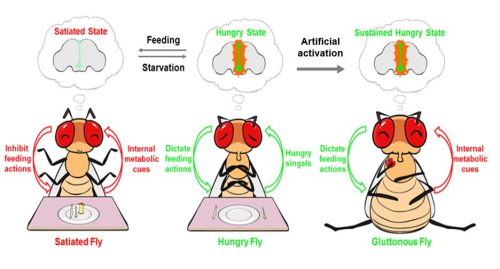Researcher at Institute of Biophysics Identifies Neurons for Appetite and Obesity in Drosophila
Controlling the appetite for eating and maintaining a constant body weight are important for health and vanity reasons. Our brain is actively involved in regulating both processes. Mismatching between physiological requirements and neurological needs is increasingly responsible for obesity-inducing hyperphagia, but the process underlying the decision on when to eat and how much to eat is largely unknown.
The complexity of feeding behavior and intertwining neural-physiological processes renders the task of understanding the neural control of feeding behavior difficult. How the brain values and represents the physiological states of hunger and satiety for feeding controls and energy homeostasis remained elusive. Recently, researchers from the Institute of Biophysics, Chinese Academy of Sciences, discovered a cluster of neurons that affect appetite and control body weight in the brain of Drosophila. Their work was published in Nature Communications on December 7, 2016.
Drosophila melanogaster, the common fruit flies, represents an excellent model for investigating the conserved molecular and neuronal mechanisms underlying feeding behavior, for both wide availability of convenient genetic tools and highly conserved molecular pathways from insects to mammals in the process of metabolic homeostasis.
To gain novel insights into neural circuits integrating feeding motivation with physiological needs, the group led by Dr. ZHU Yan used neurogenetics, optogenetics, and behavioral approaches and identified a group of appetite-enhancing neurons. Artificial activation of these neurons promptly renders otherwise normal animals into a highly gluttonous state. They named these neurons 'Taotie' neuron, after the ancient Chinese ogre which is known for its insatiable appetite. Interestingly, long-term activation of these neurons generates obese flies with increased body weight and elevated body fat storage. The degree of obesity is directly correlated with the operation strength used to activate these neurons, suggesting Taotie neurons are part of neural circuit that determines the body energy homeostasis.
The researchers further found that the neuronal activity of a cluster of Taotie neurons in the neuroendocrine region of brain correlates well with the hunger/satiety states of the flies, suggesting these neurons are utilized to reflect the physiological states of the animals. The level of circulating glycemia is a crucial physiological signal for setting the activity of Taotie neurons. In turn, these neurons coordinate food intake and physiological needs by controlling insulin secretion in both satiated and hungry animals.
Previously, it was unknown whether the tiny brain of a fly possesses feeding centers as mammals, with estimated divergence time of 800 million years between them. In mammals, the hypothalamic brain centers receive information of the physiological status through hormonal signals such as leptin, insulin and ghrelin. These centers also command feeding behavior accordingly to maintain physiological homeostasis. This is the first study reveals a master center of feeding in the brain of Drosophila, with functions to both represent physiological states and coordinate feeding behavior. The study also solves the long-standing question as to what is the neural representation of hunger and feeding motivation. By providing a conceptual framework for studying hunger state and hunger circuit, these Taotie neurons will inspire a new wave of studies on the neural mechanisms of physiological homeostasis and shed light on the root of eating disorders, such as anorexia nervosa and bulimia nervosa.
This research was funded by the National Basic Research Program of China, National Natural Science Foundation of China, Chinese Academy of Sciences (CAS), and Bill and Melinda Gates Foundation.

Figure: Working Model of Taotie Neurons in Fruit Flies (Image by IBP)
Contact:
ZHU Yan, Ph.D, Prof.
Principal Investigator
State Key Laboratory of Brain & Cognitive Sciences, IBP
E-mail:zhuyan@ibp.ac.cn
Tel:86-10-64888539

